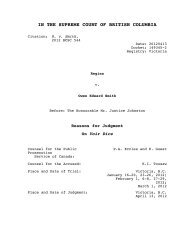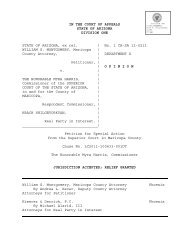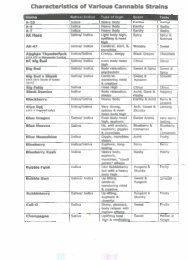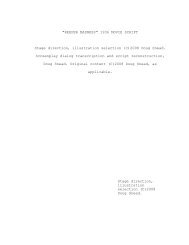3. Umbruch 4.4..2005 - Online Pot
3. Umbruch 4.4..2005 - Online Pot
3. Umbruch 4.4..2005 - Online Pot
Create successful ePaper yourself
Turn your PDF publications into a flip-book with our unique Google optimized e-Paper software.
Cannabinoids in appetite and obesity 225<br />
antagonist SR-141716 was confirmed by using CB 1 receptor-knockout mice.<br />
While SR-141716 significantly reduced food intake in wild-type mice, it was<br />
totally ineffective in mice lacking the CB 1 receptor [35, 47]. Moreover, it was<br />
shown that following temporary food restriction, the knockout mice eat less<br />
than their wild-type littermates. These results suggest the existence of an<br />
endogenous cannabinoid orexigenic tone which, when disrupted, may lead to<br />
decreased food consumption.<br />
Interaction between cannabinoids and hormones controlling energy<br />
homeostasis<br />
The link between cannabinoids and the anorexigenic hormone leptin was first<br />
suggested by Di Marzo et al. in 2001 [35]. Acute leptin treatment of normal<br />
mice and ob/ob mice (mutant mice lacking the leptin gene) not only decreased<br />
food intake but also resulted in decreased levels of anandamide and 2-AG in<br />
the hypothalamus. On the other hand, defective leptin signaling was associated<br />
with elevated hypothalamic but not cerebellar levels of endocannabinoids in<br />
obese db/db and ob/ob mice and Zucker rats [35]. These findings suggest a<br />
direct link between endogenous cannabinoids and the leptin-controlled energy<br />
homeostasis. Moreover, interactions between the cannabinoid system and<br />
other neuropeptides involved in the control of food intake have also been suggested<br />
in the literature. A cross-talk between the orexin-1 and the CB 1 receptors<br />
was recently described [48], and a synergistic interaction between CB 1<br />
and melanocortin MC4 systems in feeding behavior has also been reported<br />
[49]. Moreover, the co-expression of hypothalamic CB 1 mRNA with corticotropin-releasing<br />
hormone (CRH), cocaine-amphetamine-regulated transcript<br />
(CART) and melanin-concentrating hormone (MCH) may also be indicative of<br />
possible interactions between the cannabinoid system and these peptides.<br />
Cannabinoids and motivational processes<br />
Ingestive behaviors, however, are not only linked to energy homeostasis control,<br />
as the brain-reward system, a complex neural network activated by pleasurable<br />
stimuli also mediates the incentive or hedonic value of food. The association<br />
of the cannabinoid system with the motivational processes is indicated<br />
by several lines of evidence. The preference for palatable sweet-food intake<br />
induced by administration of cannabinoid agonists in both humans and laboratory<br />
animals is most likely indicative of the involvement of an effect on the<br />
brain-reward systems. Moreover, the CB 1 antagonist SR-141716 not only<br />
selectively decreased the intake of sweet or palatable food, but also decreased<br />
both alcohol [29, 32] and nicotine self-administration in rats [50]. It also<br />
decreased heroin self-administration in rats [51] and was shown to reduce the<br />
reinforcing value of the median forebrain bundle (MFB) electrical stimulation







